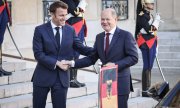Scholz and Macron in Paris: bye-bye frictions?
A lunch in Paris to iron out their differences: after the three-hour meeting between French President Macron and German Chancellor Scholz on Wednesday, the German side said the talks on rising prices, energy supplies and armament projects had been productive. Joint working groups are now to be set up to deal with these issues. Commentators discuss the Franco-German axis.
Multiple reasons for annoyance
France resents some of Germany's policies, Jutarnji list comments:
“Firstly, Germany and France had different opinions when EU states disagreed over whether the EU should also classify nuclear power as green. Then Germany angered France - as well as the majority of the EU states - with its 200 billion aid package. ... There was also no real cooperation on the idea of building the Iberian Gas Pipeline. ... But the biggest problem for Paris seems to be Germany's decision to strengthen its defence capabilities by buying US technology and weapons.”
Nations are unpredictable and selfish
The EU should correct its view of the individual member states, Le Point advises:
“It must reckon with the fact that its members do not always have the same agenda. ... This is necessary to prevent differences of opinion from coming to a head in murderous forms. Its equation for Paris and Berlin, whose unknown quantities it thought it had resolved by promising lasting peace, has become a trap. Europe can only be built on the basis of its true history, without illusions, without hypocrisy, and by seeing nations for what they are: changeable, unpredictable and, unfortunately, selfish.”
Less romanticism, more realism
Handelsblatt's Paris correspondent Gregor Waschinski calls for a more open approach to different interests:
“A new chapter in the partnership requires a better understanding of each other's differences. Take security policy, for example: France envisages a European defence community with autonomous capabilities in the area of military equipment. Of course, Paris also has the interests of its arms companies in mind. In Germany, there is a transatlantic component to the understanding of security. ... These differences are not a disaster, the Franco-German foundation remains strong. Nevertheless it is essential to redefine the relationship. The guiding principle must be: less romanticism, more realism.”
Franco-German motor needs to be fully functional
France and Germany should act in concert, the Financial Times urges:
“Despite differences of style between the pragmatic, technocratic Scholz and the idealistic Macron, moreover, there is scope to find common ground. An August speech by the German chancellor calling for a 'geopolitical' and 'sovereign' Europe echoed some favourite themes of the French president, though focused more on institutional reforms than grand vision. How the EU operates does need rethinking for the future. Today, however, as it prepares to face its sternest tests since the Ukraine war began, Europe needs its Franco-German motor to be fully functioning.”
Reinvention phase normal at such times
The Franco-German axis is suffering as a result of the recent geopolitical shifts, Luuk van Middelaar comments in his column in NRC Handelsblad:
“We should not dramatise the acute political annoyances. They are the result of an unspoken unease about the major strategic shifts. The Russian invasion was the biggest shock for Europe since the Cold War. Just as in 1989, it is putting the continent's equilibrium and therefore the Franco-German relationship to the test. ... Europe's centre of gravity is shifting eastwards, which puts Germany at the centre. France, which sees itself as the leader, is being left behind on the Atlantic western flank.”

